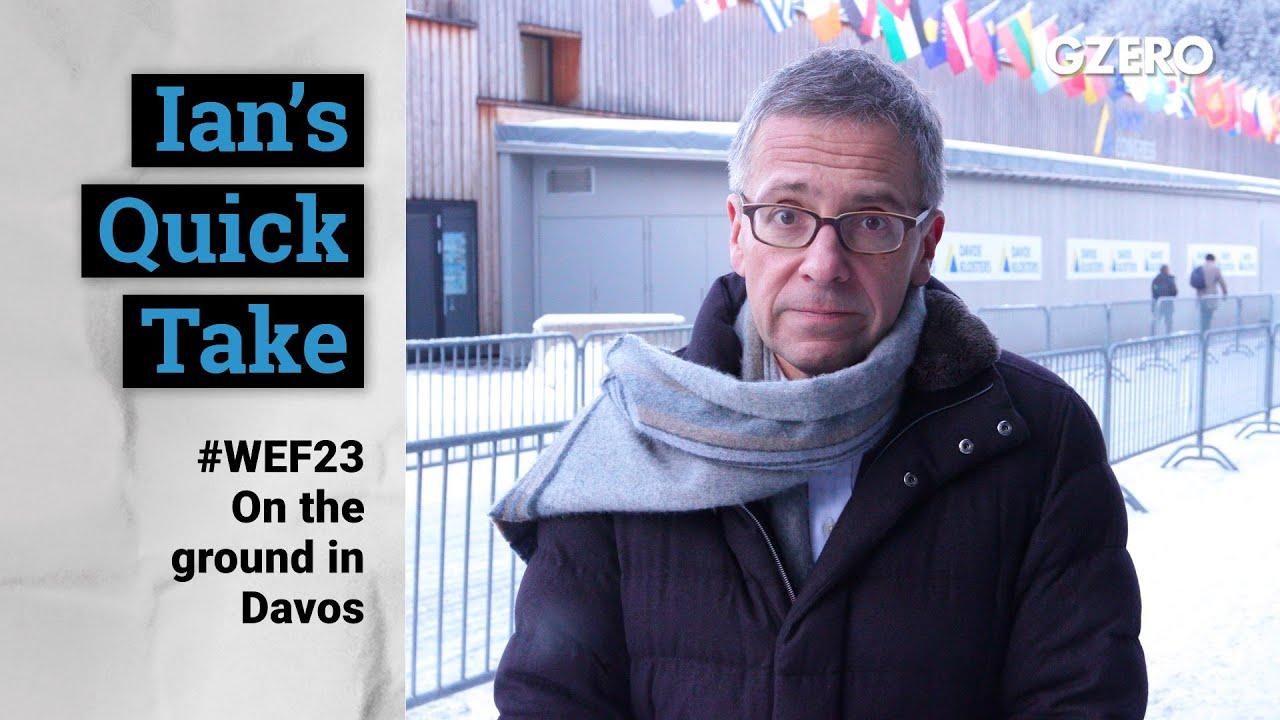Quick Take
Europe grapples with insecurity, instability, and proxy war: Davos 2023

Europe Grapples With Insecurity, Instability, & Proxy War | Davos 2023 | Quick Take | GZERO Media

Ian Bremmer's Quick Take: Hi everybody, Ian Bremmer here from Davos. We're just kicking off the annual forum in Switzerland, its 53rd Annual Meeting. And here I am in the cold, but not absolutely frigid, to talk with a bunch of global leaders and 52 heads of state showing up. 2,700 world leaders are going to be here for the week, and that means that you can get a hell of a lot of work done in a relatively short period of time.
Big issues to be discussed. Well, first and foremost, we are in Europe, and that means they are feeling a lot more negatively about the geopolitical environment than we are across the Atlantic. Why? Because the Russian invasion is affecting them directly. It's the permanent end of a 30-year long peace dividend for Europe. It means they are all dramatically ramping up their security spend. They think they're going to have to for the foreseeable future. It means that energy prices, even though they've managed to do a lot on that and they're lower than people expected, they're still a lot higher for the foreseeable future than they would otherwise want. And also, of course, because there are massive numbers of refugees that are being hosted in Europe still from Ukraine, and the concerns about insecurity, instability, what it means to be fighting a proxy, hot war against the world's largest nuclear power right across the border, that's something that people are still trying to grapple with on the mountains here.
Beyond that, a lot of talk about the fragmentation of globalization, about what it means that we're going to have multi-speed recession, some deep, some shallow, some not at all, all over the world this year. Technology companies, after they've been expanding for 10 years, some of them shedding employees. They're all still here, but not splashy in the way that they were, say last May. Post-COVID, as the world comes out of that, you don't see the same level of, "We are masters of the universe," for all of these tech companies. A little bit more caution there.
The Chinese are here, but of course, they're much more interested in big global fora that they are setting the standards of, that they are running, and that's very different from the precepts of globalization that have been driven by the World Economic Forum for the last 53 years. In that regard, talking about a fragmented world and can you find cooperation, which is the theme for this year's annual forum, is one that's very challenging. Can you find global cooperation if people don't do global anymore? I mean, there are a lot of global things of course, climate change is very global, but the advanced industrial economies are focusing mostly on their own populations. They're not spending a lot of money trying to take care of the poorest in the world. And in fact, on the back of the pandemic, on the back of the Russian invasion of Ukraine, and on the back of growing climate change, the biggest challenge that we see as a global order is a growing gap between West and South. The fact that human development indicators have actually been worsening now for three years after 50 years of consistent improvement from globalization.
That's a message that should be front and center for every CEO that's attending the World Economic Forum this week. But of course, it won't be. Why? Because the difference between globalization and globalism is real. And the fact of free market capitalism continues to be not only driving a lot of wealth and growth, but also a distributional challenge for a majority of the 8 billion people now living on the planet. It's a challenge that the WEF is certainly trying to grapple with, a challenge we'll see to what extent the attendees actually are interested in talking about. That's it for me. I'll talk to y'all real soon.
In this "ask ian," Ian Bremmer analyzes Trump’s recent meeting with Zelensky and how close (or far) Russia and Ukraine are from a peace deal.
Syrian President Ahmed al-Sharaa attends the military parade of the Syrian army in Umayyad Square in central Damascus to mark the one-year anniversary of the fall of the Assad regime, on Dec. 8, 2025.
A year ago this month, Syria’s brutal dictatorship collapsed. There are signs of recovery, but sectarian violence threatens to undermine the optimism.